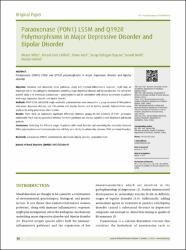Paraoxonase (PON1) L55M and Q192R polymorphisms in major depressive disorder and bipolar disorder
Künye
Yildiz, M., Cam, F.C., Ates, O., Erdogan S.T., Benli, I., Demir, O., (2017). Paraoxonase (PON1) L55M and Q192R Polymorphisms in Major Depressive Disorder and Bipolar Disorder. Journal of Mood Disorders, 7(2), 86-92. doi:10.5455/jmood.20170304070525Özet
Objective: Oxidative and nitrosative stress pathways, along with immune-inflammatory response, might play an important role in the pathogenic mechanisms underlying major depressive disorder and bipolar disorder. The aim of the present study is to investigate paraoxonase 1 polymorphisms and its correlations with disease parameters in patients with major depressive disorder and bipolar disorder. Methods: PON1 L55M and Q192R single nucleotide polymorphisms were analyzed in a group consisted of 100 patients with major depressive disorder, and 100 patients with bipolar disorder and 96 healthy controls. Polymorphisms were analyzed by using polymerase chain reaction. Results: There were no statistically significant differences between groups for the existence of PON1 genotypes. Additionally, there was no association between the PON1 genotypes and disease variables in both depressed and bipolar patients. Conclusions: Evaluating the different stages of patients with mood disorders and examining the connection between PON1 polymorphisms and treatment outcomes will help us to clarify the relationship between PON1 and mood disorders.
Kaynak
Journal of Mood DisordersCilt
7Sayı
2Bağlantı
https://hdl.handle.net/11729/2137http://dx.doi.org/10.5455/jmood.20170304070525
https://app.trdizin.gov.tr/makale/TWpVek16QTJOZz09


















